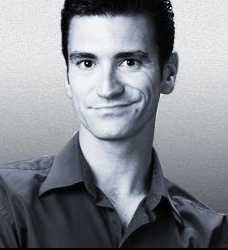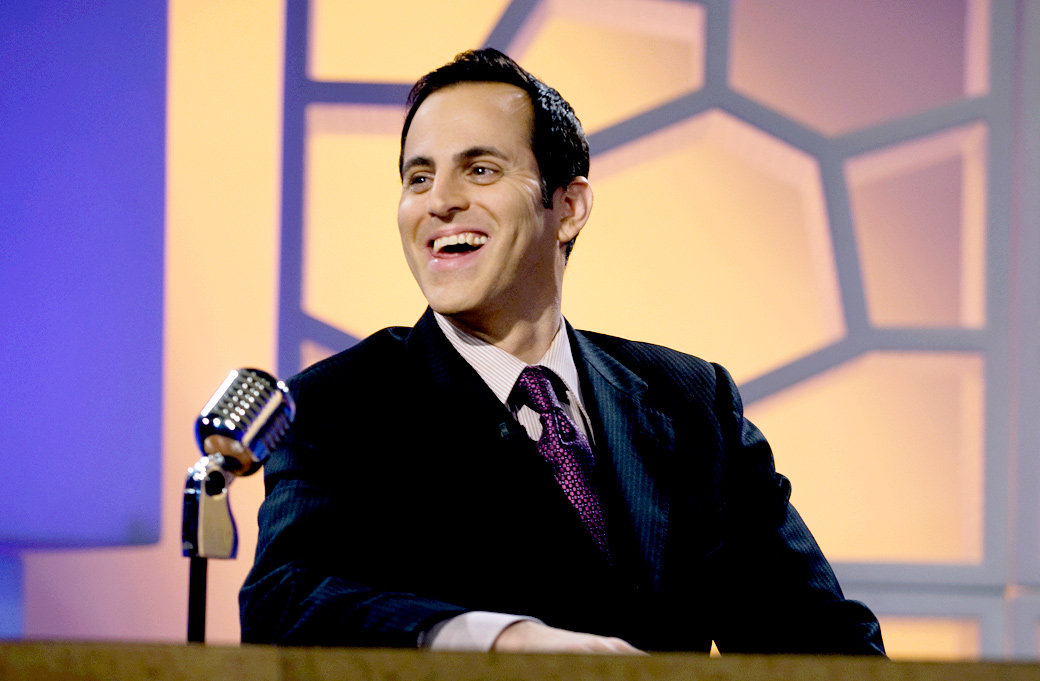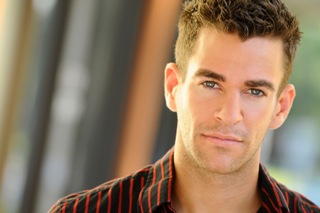Today I’m interviewing Nick Cobb. Nick recently filmed “Live at Gotham” for Comedy Central and has done commentary for MTV’s “FN MTV”, the worst show ever on MTV. Nick was also filmed a “Carmax” commercial that aired during the Superbowl (regionally). When not performing, Nick is usually obsessing about his last show.
 1. How are you using the internet / social media to promote your career?
1. How are you using the internet / social media to promote your career?
I was actually reading some of your previous interviews like the one with Judy Carter and I ended up feeling really bad (that I’m not doing enough). I have a website and I use Facebook of course, and there are thousands of little things I do like going on this blog site, that blog site, what have you. But I don’t keep a blog myself (it would feel like homework, and I’ve always considered myself more of a performer than a writer), and I’m not overly concerned with my lack of stuff online.
You’ve really gotta have a lot of time to do that thing, or a web guy that you trust. And, I don’t trust my web guy. You may be thinking “why is he saying that out loud?” to which I would say “I just fired him,” which is weird, because I also just fired my psychiatrist. But I digress… I like the website itself, but there are so many updates and so much maintenance. A lot of times, in my head, I go “I can go home, do the calendar, do all the admin stuff for my site, blah blah blah, or I can go do a couple of shows” and 9 out of 10 times I’ll go do the shows. I’ve convinced myself that’s the key to succeeding. Working on my act. Having a really good act that isn’t as well- advertised is better than very well advertised decent act. Of course, I could be dead wrong. I probably am. I am constantly hearing I need more internet “presence.” But, I’m kind of addicted to doing shows.
2. Have you noticed the payoff yet?
I have gotten booked at a few colleges just off of my website. And, I’ve been amazed that you really don’t need that long of a video. They’ll call and say “we loved your video,” and find out later they only watched three minutes. Maybe that’s just the way we’re wired now. We don’t want to sit there and watch a ten minute video anymore. You can put it there, but it probably won’t be watched. Maybe the first minute or so. The beginning of the video in particular really has to be sharp, different and unique. A lot of comics will say “it gets good four minutes in.” Unfortunately, people don’t watch it that long.
I almost feel like to have a website now, it has to be really nice, or it’s not worth having at all. If you just have an okay site, you might as well just be on Facebook. But if you have something really nice to reference to people, and they’re impressed by it, it’s really helpful. Something with good, crisp video and an updated calendar. Great. When I had just a run-of-the-mill, I think it ended up hurting me. I would’ve been better off just not having one at all. I think people will look more favorably on you if you don’t have a site than if you have just an okay one.
I remember I was in Austin, and the club didn’t know who I was. Big surprise. I asked if I could get up, directed them to my website, and the guy said, “Well, you don’t have any bookings coming up, so we can’t put you up.” I thought I had updated my calendar, but I guess it didn’t work. I probably forgot to click ‘publish’ or something.
3. I noticed your site has a user registration section, do you find that it helps build a fan base?
I haven’t taken advantage of it as much as I should. It would probably be really helpful if I did. It’s unforgivable and it’s laziness. A lot of comics swear by the mailing list. On the other hand, there are so many options online that it’s just overwhelming sometimes. There are only so many hours in a day and I would much prefer spending at least a little bit of that time writing and performing, rather than spending my entire day sending off a constant barrage of show invitations from every site imaginable, only to have people come out and see the same material because you never spend time writing or performing.
It’s getting to the point where it’s too much though: I gotta put it here, there, send it to this email list, that mailing list, it’s like I need to hire somebody just to do that. It’s a ton of admin work, and my philosophy is “if it’s between shows and sending emails, I’ll do shows.” In my experience, I have gotten more work from doing a good show (and someone sees me/books me) than I have from online stuff. But, that’s not to say I haven’t gotten anything online.
Plus, I don’t know that bookers really trust video all that much anymore anyway. Now to get booked, video isn’t enough. It has to accompany a live guest spot. You try to get a gig at a club down in the South, for example, it used to be just a video, then a DVD, then an emailed link, but none of that is good enough anymore. Now you have to send a DVD just to get the guest spot. They won’t book you unless they’ve seen you live, a couple of times, plus referrals. Referrals have been more valuable to me than my Live at Gotham video. I don’t even know what to say about that. Maybe the clubs did try booking acts off the DVDs they were getting in and then got burned a few times. From a booker’s perspective, with video, you never know if a performance has been sweetened. Referrals and guest spots, you can’t go wrong by that.
4. You post your cell phone on your website, have you had any issues with that?
No, it hasn’t been an issue. There are booking sites like gigmasters where comics compete to book a gig. And, when you submit for a gig and put in your pricing and such, the site sends the client an email and sends you their email address and phone number. Sometimes, if you haven’t booked anything, you think “Oh I’m not getting these bookings, I’m getting beat out by people who have been at it longer.” But the reason might be that some of the more aggressive comics just don’t mind actually picking up the phone and following-up with clients. While a lot of us younger guys are sending a follow-up email, somebody else is already on the line booking the gig. I think it’s an advantage to be a bit more aggressive. I’m still learning, and forcing myself to do these kinds of things. The best, of course, is when you get a feel for how technologically savvy the client is beforehand. Some prefer not to be called at all, and others will only speak over the phone.
5. What do you think about posting videos of your show online?
I think it’s necessary at this point. I think the question is, does it suffice to just put your videos on your own website? And the answer is no. People aren’t going to spend a ton of time searching for you. So you have to spread the videos around. That’s what I was mentioning before, it’s a real pain that you have to put each and every clip on so many different sites. You gotta do the event invites in all the different places and videos too. People will say “I saw you online” and I ask “where?” They say “YouTube” and I know it’s an old video, so I immediately start apologizing because I know that’s old stuff. “On Youtube? No! I don’t do that material anymore!” But if they say they saw my video on my site, I still apologize (“that stuff’s no good either!”), but not as much as if they saw it on YouTube. But it’s not one of those things you think about too much. Generally I think about “I wanna book my next gig” and not about making sure all my videos are being perfectly maintained. I’m kind of always about the next thing.
6. How do you think digital tools will change comedy?
I still think that comedy shows are best live in intimate settings – those are the best. I don’t know how many times I’ve seen somebody on TV, and I don’t think much of it, but then I see the same guy in a club or a smaller room and I’m just blown away. I don’t think that we’ve come so far that we can replace how much better a live show is. I think that’s the one downside about online videos – when people see them as a substitute for the real thing instead of a preview.
I just hope online clips don’t discourage people from going out. I hope instead of people saying, “Hey, I saw Ben’s video online, let me go watch every single other video he has,” they say “Hey, I saw Ben’s video online; I’m going to go see him live.” But they might just stop at watching all of your online stuff. Their friend will be like, “Well Ben’s coming to town to perform” and they’ll go, “Nah, I’ve already seen his whole act on YouTube.” Then what’s the point of putting clips up in the first place? There’s so much upside about getting your comedy online and out to so many, but there’s downside. Because there’s so much video out there, people may only watch 5 or 10 seconds of your clip. At a show they’ll watch the whole thing and really get you.
7. How much information do you tend to share on the social networks?
I try not to go overboard with it. I try to only plug big shows for my Facebook profile updates.
Sometimes you can look at your newsfeed and it’s like the boy who cried wolf. “This person put in their 5th status update today about their toes…” It’s constant minutia. Which is fine, but I prefer to just put down a bigger show and not put down shows that there’s no chance people can come to. Like if I’m doing a college in Idaho, I probably won’t put it down there, because you know, who’s gonna see the status update and say “let’s go book some tickets. Nick’s gonna be in the middle of nowhere”? But if it’s in The City, I’ll put it down, and maybe people will come out.
8. What’s your weirdest online experience involving your comedy career?
I had a few in the beginning where people would find me online after seeing a show and email me, which is nice, but I just have nothing to say to them. Aside from the typical thank you’s and such. I thought fans were reserved for people who were doing it forever and on TV. It’s so weird to go to a show and hear “I heard you’d be on this so I came out.” It’s really strange. Of course, that hardly ever happens so I don’t really have worry about it.
I’m always in awe of the number of friend requests you can get after doing some show in the middle of nowhere where you didn’t think anyone was even listening. The kind of gig where you have to ask the band to stop setting up (or playing). And you even get friend requests from people who didn’t like the show. “You just wanna friend me to tell me you didn’t like it?” I guess I just wanna control what I put out there, and I’d rather put out smaller amounts in an environment I understand better – stand-up. That’s why I don’t do that many status updates or tweets. Although perhaps I should.
I’ve also had negative experiences where people will book me based on video (let’s say, for the sake of argument, it’s even a video I really like) and I’ll go in and do the gig, and the material is completely inappropriate for the gig they want me to do. I’d be like “oh they like this video, so I’ll be sure to do that material from the video,” and it turns out to be completely inappropriate for the show. I don’t mean it’s dirty when it should be clean, just that it’s not what they wanted. Well, why did you book me based on the video then? Because I did that exact same stuff for you! A guy actually said once that I didn’t perform “the video material” with the same intensity that I did in the video. But, in the video, I was in front of a couple hundred people, and his show maybe twelve. So, you still need to ask questions, ‘cause so many things will be taken out of context, which is why clubs are still based largely on referrals and guest spots. They’ve been burned too many times. So, I still think word of mouth and reputation are the most important things in comedy.

 Who are the different types of people you will audition for in your career?
Who are the different types of people you will audition for in your career?


